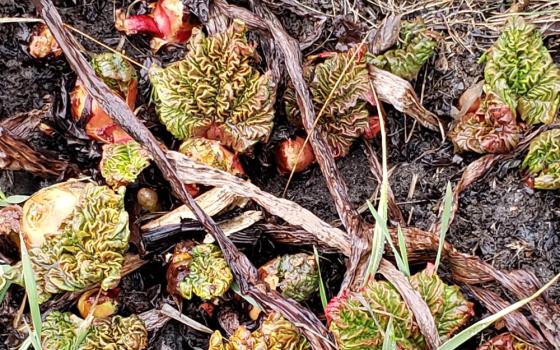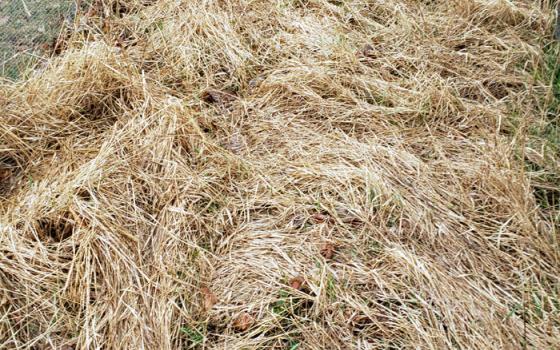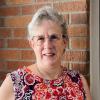By harvest time last fall, my little 3-year-old neighbor helper was moving away. She had helped all summer. My dad wasn't really interested; his neighbor was supplying him fresh produce. So why bother with a late season planting? Not much happened. With little motivation I simply left the garden. And it overgrew quickly.
As harvest ended and frost approached, the garden got more and more overgrown, my stone path no longer visible. The chives and strawberries, rhubarb and spinach were all buried under tall grass and weeds. I saw the mess every day; it couldn't be missed as it was right in the middle of the yard. As I mowed the lawn and raked around it I grew more and more resentful: Was it time for the garden to go?
The changing seasons brought terrible news. Out of nowhere, and in a matter of days, Dad was diagnosed and later dead. The doctors couldn't believe it, and my sister and I were left stunned and numb. So alive and then dead, finally able to be reunited with his beloved Rose whom he grieved for eight long years. The garden was forgotten, everything was. The framing of the fence gradually fell away as the first snows started to take a toll. I didn't care, life had changed so fast. Tearing it out would have to wait.
Life, every last detail of it, went on automatic. We worked at cleaning out Dad's house and prepared it for winter. Ministry kept me distracted and busy during the day and evenings at home meant warm fuzzy clothes with a seat on the couch and mind-numbing TV. I had no idea what had happened. I was nowhere near ready to process it, and even less ready to pray.
Easter Sunday found me at a late morning Mass, not my usual bright and early — especially for Easter. I just wasn't into it, I didn't want to be there — and to be honest I'm not quite sure how I got myself there. The presider bore a striking resemblance to my dad: a big man, gray and bearded with an ear to ear smile. Terrific. I could not leave; I was trapped in the middle of a very long pew. I told myself it would be OK, my experience of major feast days is the preaching is often average or mediocre at best, and there were plenty of other things to look at besides the presider.
As if he were speaking directly to me he started, "Everything happened in the garden." What? It all happened in the garden?! He went on to say the garden is "the place of encounter. The place of prayer, of betrayal, of wounding, of healing, and so much more." I'm not sure if he asked them or not but the questions came to me: "What's waiting for you in the garden? Will you go or not?" My garden, the overgrown mess I resented and planned to tear out, was now forefront in my mind.
Before I knew it the sprinkling rite was underway. Mindlessly singing along I looked up at just the right moment to catch the presider's grin and a face full of water; we both gasped. He was either embarrassed or amused at his "direct hit" and I was startled. Instead of wiping my face, I just let the water be, as it mixed with fresh tears. Maybe I was ready to start to explore the garden, at least the one I had left fall into decay in the yard.
My garden's gate was still standing. I had done nothing, not even picking up the fallen fence pieces. It was still wildly overgrown and clearly neglected. If I open that gate and walk in, what will I find? Given the new Easter insight I am not sure I want to be there, and I am not sure I have ever wanted to be there. What will happen to me in that garden? I was still feeling betrayed and wounded by the sudden death of Dad a few short months ago. Was I ready for encounter, prayer, healing?
Damn! Life, in spite of me. Now what? Do I dig it out, plow it under, or clean it up and nurture it? For me, right now, Easter means spending time in the garden with its mess and neglect and potential. I can only hope to stay there for a while.
[Jane Marie Bradish is a member of the School Sisters of St. Francis based in Milwaukee. Her ministry has been in secondary education; currently she teaches theology and is the academic programmer for a large, urban, multicultural high school. She recently received the Project ADAM Karen Smith Award from Children's Hospital of Wisconsin for implementing comprehensive CPR-AED (cardiopulmonary resuscitation and automated external defibrillator) programs for the school community.]


